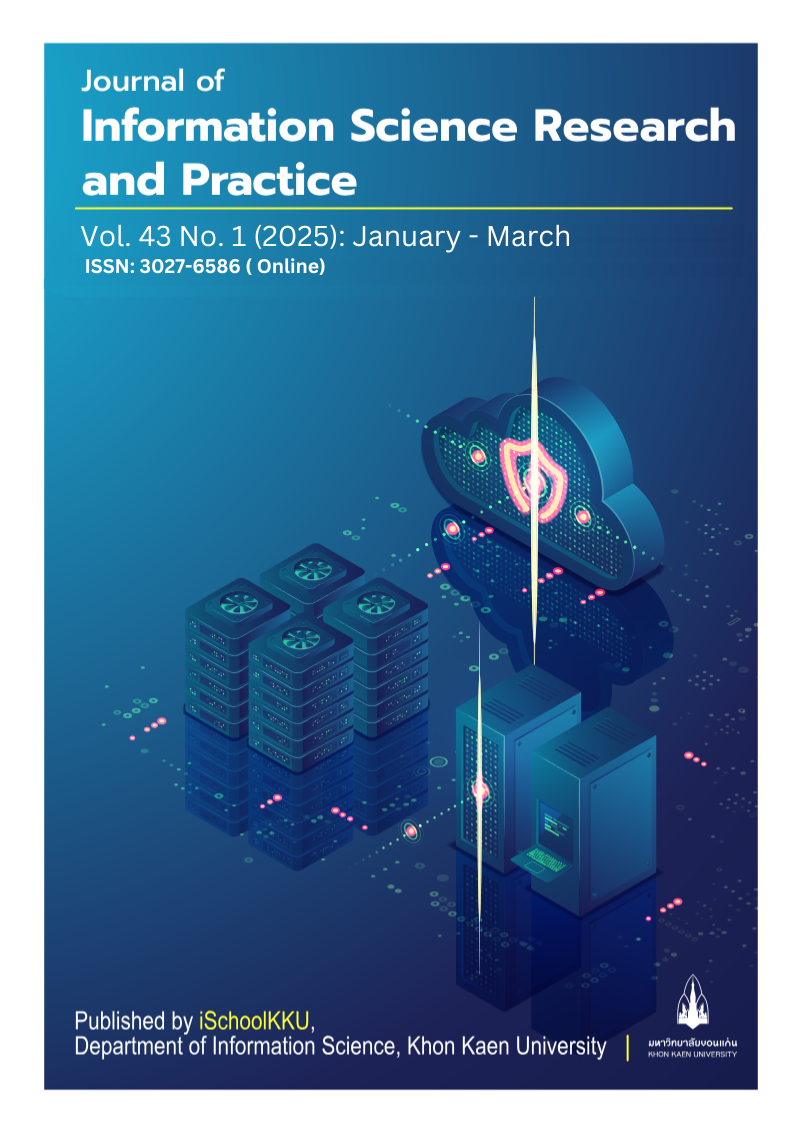The Establishment of the Digital Cultural Heritage Archives Platform, Dusit District, Bangkok
DOI:
https://doi.org/10.14456/jiskku.2025.3Keywords:
Digital archives, Cultural heritage, Cultural, Data compilation, Digital curationAbstract
Purpose: The aim of this initiative is to gather information about the cultural heritage of the Dusit District in Bangkok, and subsequently develop a digital platform for a cultural heritage database.
Methodology: The study's population and sample comprised personnel from the Dusit District Office, academics affiliated with the Ministry of Culture, specialists in data warehouse development, as well as community leaders and residents of the Dusit District. The research employed four distinct instruments: an in-depth interview recording form, a focus group discussion recording form, an efficiency assessment form for the digital data warehouse platform, and a user satisfaction questionnaire for the Dusit District Cultural Heritage Digital Data Warehouse platform. The data obtained from interviews and focus group discussions were analyzed using content analysis, while the data gathered from the questionnaires were analyzed statistically specifically by calculating the mean and standard deviation.
Finding: The preliminary compilation of Dusit Cultural Heritage comprises 32 items, which have been disseminated and made accessible through a digital platform dedicated to cultural heritage knowledge, available in both website and application formats. Expert evaluations indicate that this platform serves multiple functions: 1) it effectively records and aggregates information pertaining to community wisdom, 2) it acts as an educational resource for youth and emerging generations within the community, 3) it provides valuable tourism information for visitors interested in exploring the actual sites, 4) the website features user-friendly typography with adjustable font sizes to accommodate individual user preferences, and 5) it incorporates a secure access system, which has garnered high levels of user satisfaction during testing.
Application of this study: The establishment of this digital cultural heritage database platform functions as a tool for collecting and disseminating information across diverse domains of cultural heritage. Additionally, it can be utilized to compile important data through alternative methods.
Downloads
References
Chirakitnimit, N., & Laoakka, S. (2020). Current Conditions and Problems of Digital Cultural Heritage Archive in Thailand. Community and Social Development Journal, 21(3), 144–154. https://doi.org/10.14456/rcmrj.2020.240385
Chirakitnimit, N., & Laoakka, S. (2021, September-Secember). Development of the Lamphun Digital Cultural Heritage Archive to Promote the Creative Economy. Journal of Humanities and Social Sciences Nakhon Phanom University, 11(3), 251-266.
Cultural Heritage Promotion and Preservation Act 2016. (2016, March 1). Royal Gazette (Volume 133 Chapter 19a), 1-9.
Department of Cultural Promotion. (2022). National Intangible Cultural Heritage. Retrieved from https://ich-thailand.org/heritage/national
Digital Government Development Agency (Public Organization). (2022). Digital Government Standards: Framework for the Development of Standards for Linking and Exchanging Government Data. Retrieved from https://standard.dga.or.th/wp-content/uploads/2022/08/TGIX_Overview_Framework-v-1.3-sign.pdf
Dusit District Office. (2022). Annual action plan 2022 of Dusit District Office. Bangkok: Dusit District Office.
Thali, K. (2022). Conservation and Development of The Treasury of Cultural Information for Ang Sila Traditional Market Community, Chonburi province. Arch Journal, 34(1), 114-129.
Liu, Y. (2022). Application of Digital Technology in Intangible Cultural Heritage Protection. Mobile Information Systems, 2022, 1-8. https://doi.org/10.1155/2022/7471121
National Research Council of Thailand. (2021). Guide to standards for managing research results in digital information repositories. Bangkok: National Research Council of Thailand.
Neamtong, N. (2018). Data challenges in the digital age. Retrieved from https://www.scimath.org/articletechnology/item/8472-2018-07-18-04-04-54
Rungcharoensuksri, S. (2019). The role and challenges of the “National Heritage Office” in managing and maintaining cultural heritage information. Retrieved from https://www.slideshare.net/slideshow/ss-205926398/205926398#5
Ungsithiphunphon, S., & Laphaphon, K. (Eds.). (2020). Creating a digital archive of ethnic languages and cultures in Thailand. Nakhon Pathom: Research Institute for Languages and Cultures of Asia (RILCA).
Wells, D. (2023). What Is Data Curation? Why Is It Important? Retrieved from https://www.alation.com/blog/what-is-data-curation/
Zhu, L., & Pang, T. (2022). Research on Digital Platform Technology of Intangible Cultural Heritage in Beijing Section of Great Wall Cultural Belt. 2022 International Conference on Culture-Oriented Science and Technology (CoST), (426-430). China: Beijing Municipal Education Commission. https://doi.org/10.1109/cost57098.2022.00093








